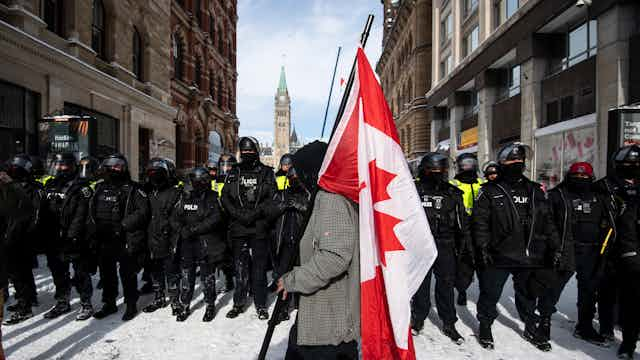Canada’s political and economic classes have managed to tiptoe around the proliferation of populism, far-right electoral inroads and referenda that have plagued other democracies over the past decade.
But Canada’s moment under the spotlight has arrived. Political risk must now be assessed for any organization pondering investing in Canada.
Read more: Islamophobia and hate crimes continue to rise in Canada
Contentious weeks of country-wide border blockades and the exhausting occupation of Ottawa by large trucks and protesters have created an increasingly dire perception of uncertainty among institutions and governments outside of Canada.
The protests have raised questions about Canada’s general ability to enforce the rule of law and uphold some of the basic tenets of safety and stability for its citizens and businesses — qualities Canadians have been renowned for. This could represent a watershed moment for Canada’s reputation as a safe and reliable investment environment.

Political risks to investments
Normally reserved for the likes of investment houses, analytics teams and large corporations interested in emerging economy opportunities, analyzing political risk is a multi-faceted concept. It can be broadly understood as occurrences in which government actions or politically charged events in a host country interfere with the performance of an investment operation.
In many countries, the stability and profitability of foreign business ventures are difficult to predict due to concerns related to political volatility, social upheaval, unrest, expropriations and regulatory or policy uncertainties.
The purpose of political risk analysis is therefore to provide companies and investors with specific information on the protection of their potential investments abroad, and on the likelihood that the investment will encounter problems specific to a country.
Foreign direct investment — known as FDI — is predicated on some form of stability, including the assumption of reasonably predictable government institutions and policies.
The Great Safe North?
Canada has long had a reputation as a stable investment environment, with strong key indicators of democracy quality, anti-corruption measures, economic freedom and a lack of political violence, maintaining country risk and credit ratings in the stable triple-A range. Recent events suggest that could change.
Increasing levels of political and economic anxiety have ensued based on concerns around populism, the future of trade agreements, retaliatory tariffs and industrial policies.
Without a sense of confidence in the overall investment environment — particularly stable institutions, policies and trust in the rule of law — foreign-owned businesses cannot clearly plan for the future and will consider moving capital elsewhere.
Siege and response
The protests ballooned through much of early 2022, initially comprising peaceful and disillusioned citizens tired of COVID-19 restrictions, but also by more nefarious anti-government and even foreign-funded groups intent on disrupting the economy and destabilizing government.
They’ve included border blockades, city occupations and even the discovery of a large weapons cache.
Perhaps more concerning in the eyes of foreign businesses and governments was Canada’s lacklustre and politically paralyzed response to the unrest. Jurisdictional and political bickering is a common occurrence in Canadian federalism, but this time the world was watching.
Seemingly few leaders or law enforcement agencies at the municipal, provincial or federal levels took ownership of the crisis for weeks, seeking to pass the buck to other levels of government. Uncertainty over legal and regulatory issues around the enforcement of laws was obvious, and the Canadian public grew impatient.
Political calculations were undoubtedly at play, even as the world started to take notice of our collective institutional failure to organize a proper response until three weeks into the protest.

Leadership sorely lacking
While hundreds of millions of dollars of daily trade were being held up by border blockades, leadership and clarity were sorely lacking.
These events required a national and provincial response, yet it was not until days of border blockades and weeks of Ottawa’s occupation that Ontario’s Premier Doug Ford declared a state of emergency and the federal government enacted the Emergencies Act.

One of the reasons cited by the federal government in invoking the act for the first time since its creation was over concern about serious political violence among different elements of the so-called “freedom convoy.”
It arguably took pressure from the United States, along with international attention, for Canadian leaders to jump into action to fight for our supposed competitive business advantage.
Since then, border crossings have reopened and a more organized enforcement plan took shape in Ottawa, but only after the city’s police chief resigned.
These events may be symptomatic of pandemic fatigue, but also increasing polarization, far-right influence and eroding trust in institutions. Canada’s abysmal response to these dangerous events requires serious reflection.
A rocky road ahead
Ultimately, the state will prevail, and order has seemingly been returned to Ottawa by a massive police operation that was generally peaceful.
But the damage to Canada’s trade and investment reputation is already done, especially with respect to its American partners.
Read more: What the Ambassador Bridge and other 'freedom convoy' blockades mean for Canada-U.S. trade
What does this mean for global trade and foreign direct investment given that new forms of political risks in once-stable democracies are on the rise, including in Canada?
These issues are different than the more traditional risks such as civil war, expropriation, terrorism and others, but they’re caused in part by underlying socio-political and economic conditions that can no longer be ignored. They’re certainly not going to disappear in Canada once the protests end.

